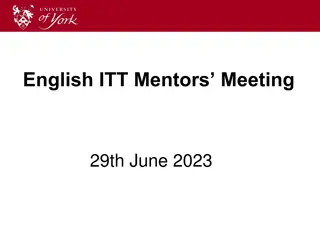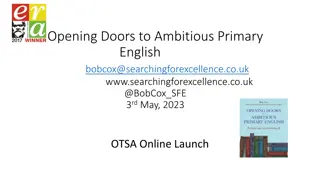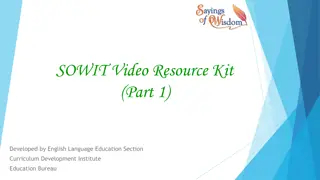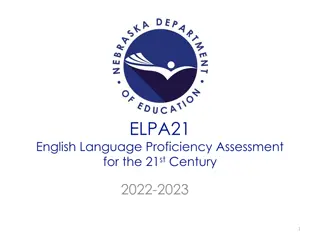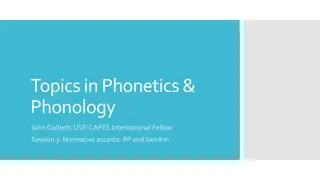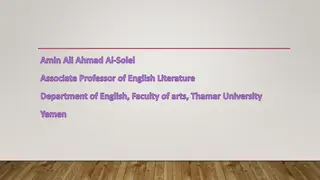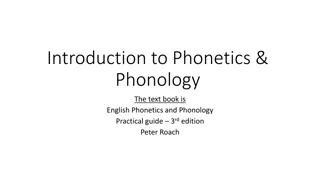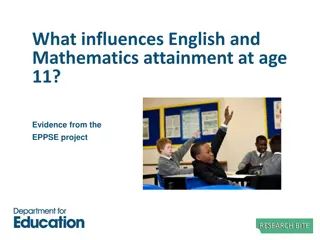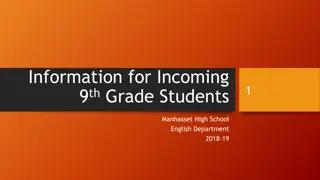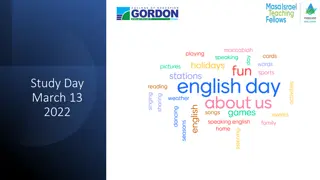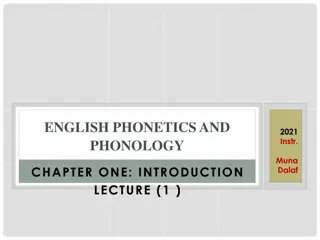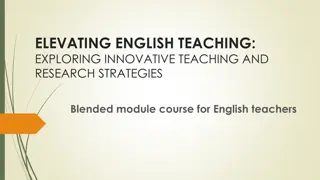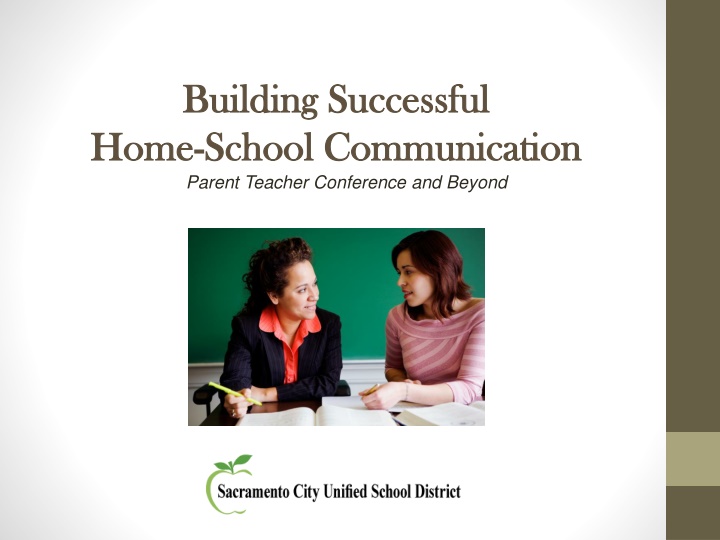
Effective Home-School Communication Tips for Successful Parent-Teacher Collaboration
Enhance your home-school communication with these valuable tips for successful parent-teacher conferences and beyond. Learn to be focused, prepared, and engaged to support your child's academic journey effectively.
Download Presentation

Please find below an Image/Link to download the presentation.
The content on the website is provided AS IS for your information and personal use only. It may not be sold, licensed, or shared on other websites without obtaining consent from the author. If you encounter any issues during the download, it is possible that the publisher has removed the file from their server.
You are allowed to download the files provided on this website for personal or commercial use, subject to the condition that they are used lawfully. All files are the property of their respective owners.
The content on the website is provided AS IS for your information and personal use only. It may not be sold, licensed, or shared on other websites without obtaining consent from the author.
E N D
Presentation Transcript
Building Successful Building Successful Home Home- -School Communication School Communication Parent Teacher Conference and Beyond
Tips To Support Successful Home-school Communication Be focused on your message Be there Be prepared Ask what you can do Follow-up
Be Focused In Your Message General tips for successful communication 1. Approach your child s teacher as a partner to build mutual respect. 2. Recognize that the teacher wants to see your child succeed in school and in life just as you do. 3. Set aside any bad school experiences that you may have had as a child. 4. Remember the topic: your child s academic achievement and how you can help them succeed. 5. Be calm and polite. 6. Start with something positive. 7. Practice active listening ask questions if you don t understand, or want to be sure.
Be There Research shows that children whose parents participate in their student s education achieve more academically. Parents attend meetings and conferences send a positive message to their child about the importance of education and the child s importance to them.
Be Prepared Talk with your child. Review your child s performance. Review homework assignments and textbooks. Make note of additional information that the teacher should know about your child (hobbies, talents, challenges). Share family information as needed. If you need translation, please request in advance. Bring a notepad and pen. Write out your questions or concerns so you don t forget them!
Preparing: Talk With Your Child Ask: 1. What do you like best about school? Why? 2. How do you feel about your homework assignments? 3. Do you get your class assignments done on time? 4. Tell me some ways that you work with other children in the classroom. 5. What are your favorite things in the cafeteria and on the playground? 6. Is there anything you d like me to talk with your teacher about? 7. What are three things you think you can improve on this school year? How will you do that?
Preparing: Review Your Childs Performance 1. Review Standardized Test Scores; ELPAC scores and other assessment scores such as Benchmark tests. 2. Review homework grades, fluency reports and test scores. Are your child s scores meeting expectations? 3. Review assignment workbooks. What problems do you see, if any? 4. Where does your child excel? What subject gives your child difficulty?
Share Additional Information that the Teacher Should Know About Your Child 1. Does your child have any diagnosed medical conditions or mental health challenges that the teacher needs to know about? 2. Does your child have any behavior challenges that might affect learning? 3. Are there any family challenges that the teacher should know about? (Moving, new baby, illness, etc.)
Write Down Your Questions SAMPLE QUESTIONS 1. Is my child performing at grade level? 2. How is my child progressing in learning English? 3. What are my child s strengths? In what areas could s/he improve? 4. How is my child doing socially? 5. How does my child behave in class? 6. What can I do to help my child? 7. How can I help support your work in the classroom?
The Conference 1. Both parents should attend, if possible. Bring your child to the conference when they are old enough to understand and participate. 2. Practice your active listening, and be sure to repeat what you ve heard if you are not sure, or ask questions. 3. When you have your turn to speak, first tell the teacher something positive about the class or about what your student is learning. 4. Tell the teacher how you are supporting learning at home: what habits you encourage, and the routines for homework and reading.
Follow Up 1. Even if your child attended the conference with you, take some time to sit down and discuss what occurred with him. 2. Be sure to point out your child s strengths along with areas that teacher describes as needing improvement or more practice. 3. Explain to your child that you and the teacher are part of a team and have made a plan to support his or her education. 4. If the teacher suggested home activities, try them out. 5. Follow-up with the teacher . 6. Ask for updates.
Contact us: Family and Community Engagement Office Serna Center Parent Resource Center 5735 47th Avenue, Sacramento CA 95824 (916) 643-7924 Sean Alexander, Supervisor Prisila Isais, Family Partnership Facilitator Nakeya Bell, Family Partnership Facilitator


